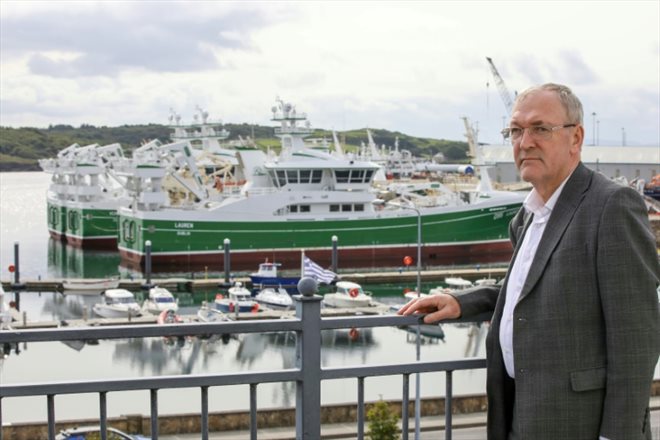Fishing boats in the port of Killybegs, in the northwest of Ireland, on August 4, 2023 (AFP/Archives/Paul Faith)
Upon graduation, Darragh McGuinness knew his calling: to join a fishing crew. But with the warming of the Atlantic, this 23-year-old Irishman now fears the disappearance of this activity which has supported his family for generations.
“It’s a huge problem,” Darragh McGuinness told AFP from the cockpit of the Atlantic Challenge, moored in the port of Killybegs in northwestern Ireland. “It could put an end to fishing, in Ireland at least.”
The sharp rise in temperatures in the North Atlantic this summer has increased the pressure on an already struggling sector. It has heightened fears of changes in fish migrations, which would push some species north to colder waters. The blow could be fatal.

Michael O’Donnell poses near his fish stock in Killybegs, western Ireland on August 4, 2023 for a photograph with some of his fish stock in Killybegs, western Ireland on August 4, 2023. Soaring temperatures in the North Atlantic Ocean over the summer months have raised fears that fish could be pushed to colder waters, heaping pressure on the already struggling industry. (AFP/Archives/Paul Faith)
In late July, North Atlantic waters reached an average temperature never before measured, with a record surface water temperature of 24.9°C, according to the US Ocean Observation Agency and atmospheric (NOAA).
The Atlantic Challenge, like many Killybegs boats, catches blue whiting and mackerel – highly prized in international markets – and returns to port after a day or two of fishing to ensure the produce is fresh.
“If we were to go further, too far north, it would no longer be possible to return to Killybegs” with fresh fish, explains Darragh McGuinness.
– “Extreme” heat –
Climate change is having a “dramatic effect” on stocks of white fish, such as cod, which prefer cold waters, adds Sean O’Donoghue, director of the Killybegs Fishermen’s Organisation.

Daragh McGuinness poses at the Atlantic Challenge in Killybegs, northwest Ireland, August 4, 2023 (AFP/Archives/Paul Faith)
He fears it’s “just a matter of time” before so-called pelagic fish, such as mackerel, blue whiting and herring, move north: “If the water continues to warm, ( …) we could end up with very few fish”.
He observed that Icelandic fishermen catch more mackerel, while members of his organization catch more species like anchovies and sardines, which are usually found in warmer southern waters.
The temperatures recorded in July are all the more worrying as the North Atlantic generally reaches its temperature peak in September.
In June, NOAA noted an “extreme” marine heat wave off Ireland and the UK.

Sardines at a fishmonger’s in Killybegs, northwest Ireland, on August 4, 2023 (AFP/Archives/Paul Faith)
That month, temperatures 4 to 5 degrees above summer normal were recorded off the Irish coast, says Glenn Nolan, who heads the oceanographic and climate services of the Irish Marine Institute.
Very high temperatures, up to 24.5 degrees, were recorded in bays in County Galway (west), he said. “It’s much more than you would normally expect.”
Mr Nolan expects a study attributing the June and July temperature spike to climate change to be published shortly.
The UN’s International Panel on Climate Change (IPCC) has attributed the intensity of marine heat waves to global warming for decades, notes the Galway-based expert.
– Double penalty –
Extreme temperatures could well cause changes in fish migration, confirms Glenn Nolan. Algal blooms in warm waters are already causing “problems for shellfish and fish,” he points out.

Sean O’Donoghue, director of the Killybegs Fishermen’s Organization, on August 4, 2023 in Killybegs, northwest Ireland (AFP/Archives/Paul Faith)
Another major challenge facing Irish fishing is the consequences of Brexit. Ireland, a member of the European Union, has seen its fishing quotas cut by 15% by 2025 as part of the last-minute trade deal struck between London and Brussels.
“Unfortunately, the agreement reached has hit Ireland disproportionately,” said Sean O’Donoghue.
He wants changes to European fisheries policy to take into account the impact of Brexit on the sector in Ireland and to mitigate the effects of climate change.
“We are not happy with the way Europe’s Common Fisheries Policy is going at the moment. You have to take into account Brexit and climate change,” insists Mr O’Donoghue.
© 2023 AFP
Did you like this article ? Share it with your friends with the buttons below.




